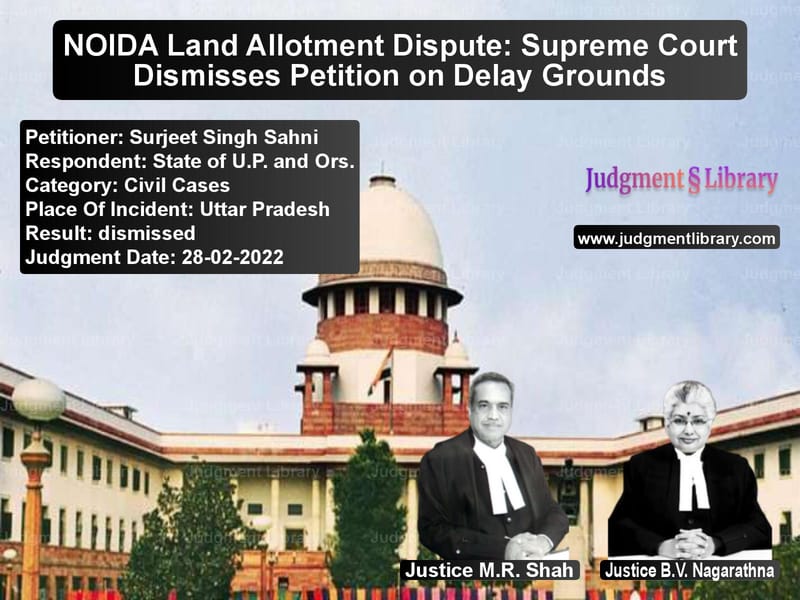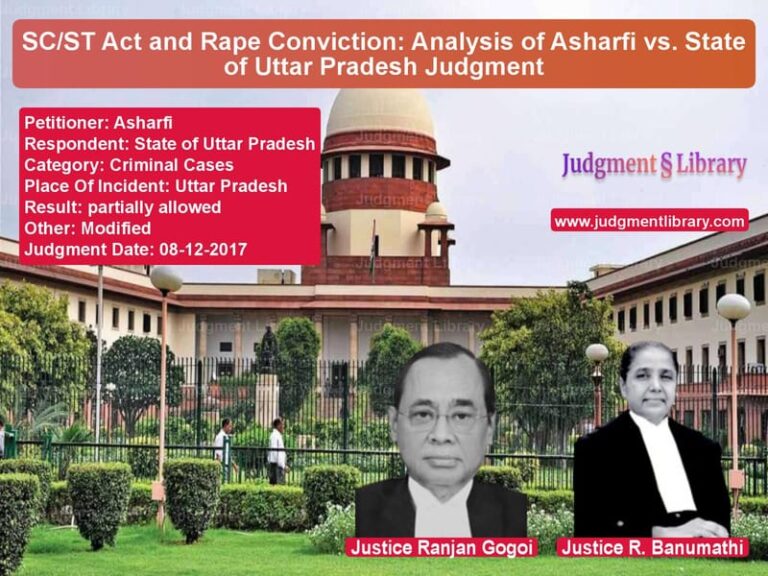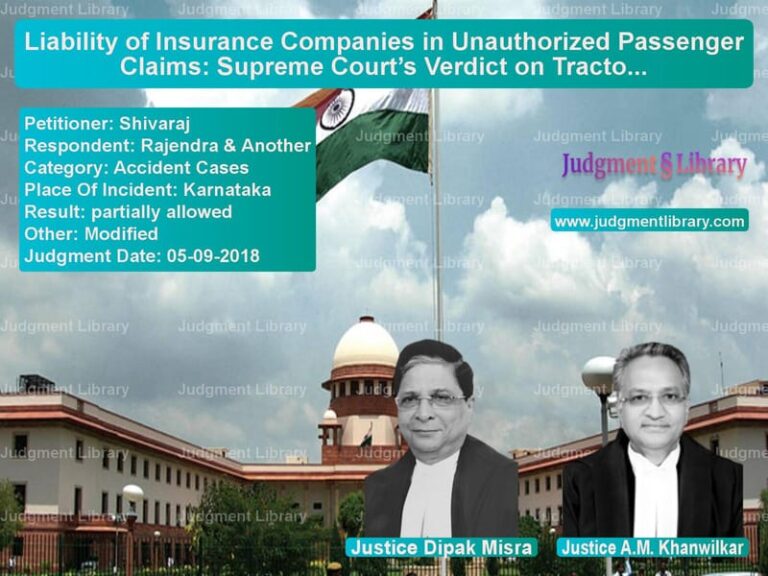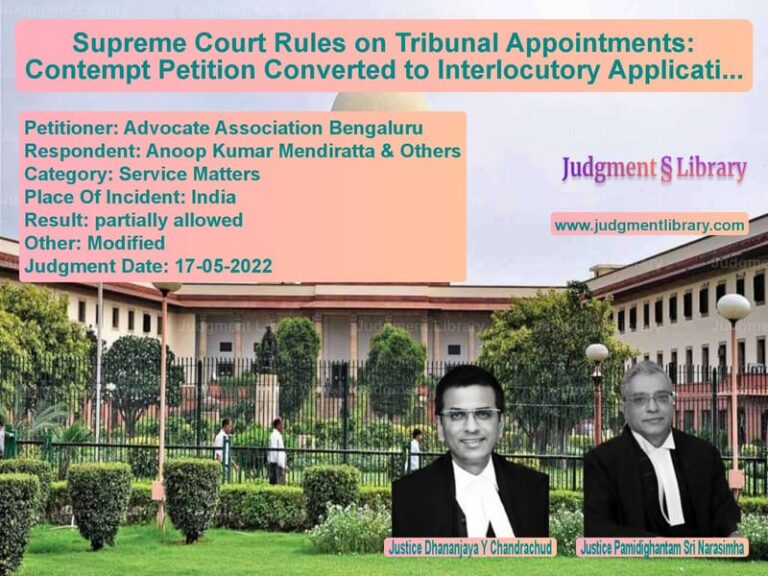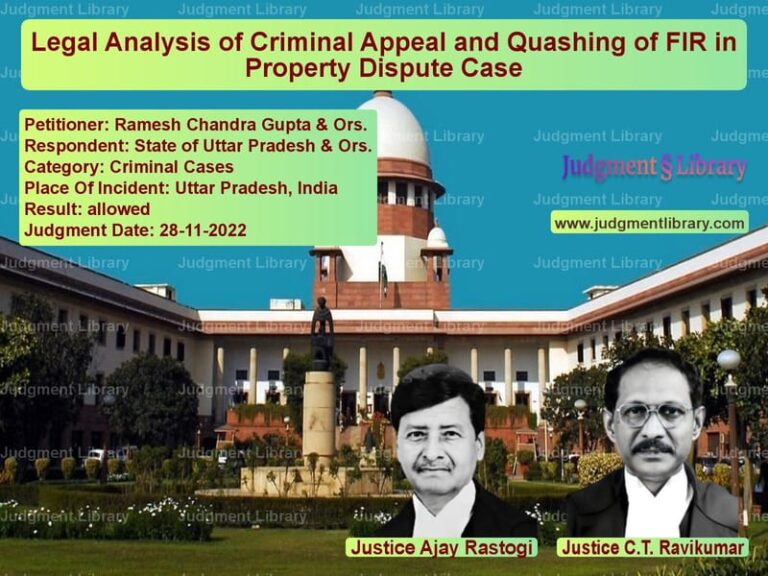NOIDA Land Allotment Dispute: Supreme Court Dismisses Petition on Delay Grounds
The case of Surjeet Singh Sahni vs. State of U.P. & Ors. revolves around a dispute concerning the allotment of land by NOIDA (New Okhla Industrial Development Authority). The petitioner, Surjeet Singh Sahni, sought enforcement of a clause in a sale deed executed in 2001, which allegedly entitled him to a 10% plot allocation.
However, the Supreme Court, in its judgment delivered on February 28, 2022, dismissed the petition on the grounds of delay and laches. The judgment, authored by M.R. Shah and B.V. Nagarathna, upheld the High Court of Allahabad’s decision rejecting Sahni’s claims.
Background of the Case
On September 19, 2001, Surjeet Singh Sahni sold a plot of land (Plot No. 163 of Khata No. 254) to NOIDA under the provisions of the U.P. Industrial Area Development Act, 1976. The sale deed contained a crucial clause (Clause 12), stating that the petitioner would be entitled to a 10% plot allocation upon payment of a proportionate amount.
Despite this provision, the petitioner did not take any action for nearly a decade. He submitted a representation to NOIDA only in March 2010, seeking the allotment of land as per Clause 12. This representation was eventually rejected by NOIDA on May 23, 2017.
Legal Proceedings
- In 2011, Sahni filed a writ petition before the Allahabad High Court, requesting that NOIDA be directed to allot the 10% plot.
- The High Court entertained the petition, despite the delay, and directed NOIDA to decide the representation within six weeks.
- Upon rejection of the representation, Sahni filed another writ petition (W.P. No. 40336 of 2017) in the High Court, again seeking allotment.
- The High Court dismissed the petition on multiple grounds, primarily citing the delay of 16 years in raising the claim.
Arguments Presented
Petitioner’s Arguments
The petitioner contended that:
- Clause 12 of the sale deed explicitly entitled him to 10% of the land on payment of a proportionate amount.
- As an “Original Farmer,” he was also entitled to a “Rehabilitation Bonus.”
- The High Court erred in dismissing his claim by citing delay, as NOIDA had not acted on the agreement.
Respondents’ Arguments
The respondents, including NOIDA and the State of U.P., countered that:
- The petitioner had failed to act on his rights within a reasonable time.
- The writ petition was an attempt to seek specific performance of a contract, which should have been pursued through a civil suit, not a writ petition.
- Since the original sale occurred in 2001, the claim was barred by limitation.
Supreme Court’s Observations
The Supreme Court agreed with the High Court’s findings and emphasized the doctrine of delay and laches in public law remedies.
Justice M.R. Shah observed:
“A writ petition under Article 226 of the Constitution of India for specific performance of a contract, especially after 10 years, is not maintainable. If a suit had been filed for specific performance, it would have been barred by limitation.”
Further, the Court criticized the practice of allowing belated claims to be entertained through writ petitions, stating:
“Mere representation does not extend the period of limitation. The aggrieved person must approach the court expeditiously and within reasonable time. If found guilty of delay and laches, the High Court should dismiss such petitions at the threshold.”
Final Judgment
The Supreme Court concluded that the petition was devoid of merit and dismissed it accordingly. The Court reiterated that writ petitions could not be used to enforce contractual obligations, especially when significant delay is involved.
With this decision, the Court has reinforced the importance of timely legal action and clarified that contractual disputes should be addressed through appropriate civil remedies rather than writ jurisdiction.
Petitioner Name: Surjeet Singh Sahni.Respondent Name: State of U.P. and Ors..Judgment By: Justice M.R. Shah, Justice B.V. Nagarathna.Place Of Incident: Uttar Pradesh.Judgment Date: 28-02-2022.
Don’t miss out on the full details! Download the complete judgment in PDF format below and gain valuable insights instantly!
Download Judgment: surjeet-singh-sahni-vs-state-of-u.p.-and-or-supreme-court-of-india-judgment-dated-28-02-2022.pdf
Directly Download Judgment: Directly download this Judgment
See all petitions in Contract Disputes
See all petitions in Property Disputes
See all petitions in Specific Performance
See all petitions in Damages and Compensation
See all petitions in Judgment by Mukeshkumar Rasikbhai Shah
See all petitions in Judgment by B.V. Nagarathna
See all petitions in dismissed
See all petitions in supreme court of India judgments February 2022
See all petitions in 2022 judgments
See all posts in Civil Cases Category
See all allowed petitions in Civil Cases Category
See all Dismissed petitions in Civil Cases Category
See all partially allowed petitions in Civil Cases Category

